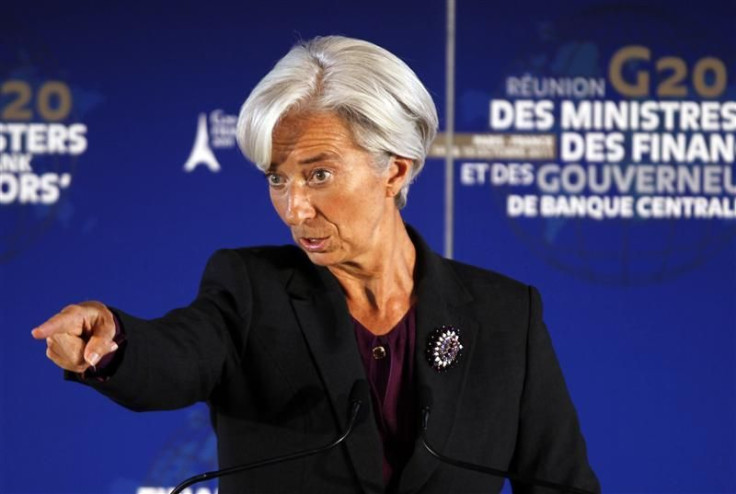G-20 Finance Ministers to Address Europe Debt Crisis, IMF Funding

Finance ministers and central bank governors from the world's wealthiest nations meet this weekend in Mexico City to tackle the euro zone debt crisis and ways to increase funding for the International Monetary Fund as well as influence how those funds are used.
Known as the G-20, the group is composed of finance ministers and central bankers from 19 wealthy economies -- they account for about 80 percent of the world's economic activity -- plus the president of the EU's European Council and the head of the European Central Bank.
The Mexico meeting comes just days after euro zone finance ministers reached a €130 billion ($172 billion) rescue deal for Greece that takes a significant chunk out of the country's growing debt.
But that bailout has only momentarily alleviated concerns of a sovereign-debt default in Europe. The IMF has warned that even with the rescue, Greece's ratio of debt to gross domestic product could still be 159 percent by 2020.
The tone of the recovery has improved, and financial conditions have eased since G-20 finance ministers and central bank governors last met, in the autumn, reflecting, in part, important policy developments, said Lael Brainard, U.S. Treasury underecretary for international affairs. But the recovery is still fragile and vulnerable to shocks, and the G-20 needs to remain active and alert to downside risks.
The G-20's preferred vehicle for assisting struggling economies is the IMF, which means much of this weekend's discussion will be about funding the agency and influencing how its resources are used.
Participants began pressing their positions ahead of the summit's formal opening.
The finance minister of host country Mexico, Jose Antonio Meade, said Friday that the G-20 won't be able this weekend to decide how to provide the IMF with more resources to help ease the European crisis, Reuters reported.
It's still early in the process to start to discussing ways and amounts precisely, Meade was quoted as saying.
A Brazilian government official told Reuters, on condition of anonymity: We don't expect a deal on IMF financing this time around, but we want to see specific language in the [post-summit] communique on the mechanisms that could be used to boost IMF resources.
Mohamed El-Erian, head of Pacific Investment Management Co., or Pimco, the world's biggest bond-fund manager, warned Friday in a Financial Times essay that IMF funding has been so slanted toward Europe that some euro zone countries have started to depend on its funding. He urged non-European nations to resist Europe's pressure on the IMF to make exception after exception on behalf of struggling countries that use the euro.
This is an internal issue that the IMF cannot, and should not be expected to, solve, El-Erain wrote. It is up to the euro zone to decide whether to go forward in its current configuration towards a fiscal union or whether to first slim down to a more coherent and stable configuration.
As tempting as it is, the Pimco chief added, Europe should not seek to obfuscate this critical decision by using IMF financing to give the appearance of sustaining the unsustainable. It must start making the necessary, albeit very difficult, decisions. Until this happens, the G-20 has a global responsibility to protect the IMF from further damage to its credibility and legitimacy.
Euro zone countries have funneled about $187 billion into the IMF. Other countries haven't yet committed. The IMF, which in January said it needed $500 billion to support nations in debt crisis, said it needs the additional money for countries around the world.
With a burgeoning national debt of its own, the United States, along with Canada and other members, has expressed a reluctance to pump more into the IMF without conditions.
The question of how to contain the fallout from the collapse or near collapse of struggling economies has also emerged as a key agenda item.
We see the need for what's been called the global financial firewall to protect countries against the risk of contagion, IMF spokesman Gerry Rice told reporters in Washington on Friday.
Part of that firewall is an increase in IMF resources, which we have said would supplement resources that the European authorities would put on the table.
IMF Managing Director Christine Lagarde has asked euro zone leaders to first bolster the European Financial Stability Facility, the euro zone's permanent rescue fund, before receiving any more IMF funding.
U.S. Treasury Secretary Timothy Geithner and Brainard have said the euro zone needs to rely on its own rescue fund and more money of its own and to develop its own firewall in the ongoing debt crisis.
Europe needs to demonstrate that they have a short-term crisis response mechanism, a firewall that clearly signals to the markets that euro area member states who are undertaking serious, ambitious reforms will be able to fund themselves at affordable rates while those reforms are being implemented, Brainard said.
© Copyright IBTimes 2024. All rights reserved.











